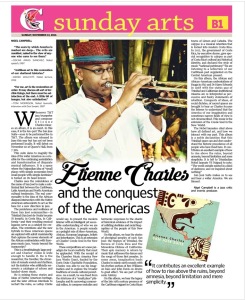Or Read here:
“Antillean art is this restoration of our shattered histories...”
—DEREK WALCOTT, Nobel lecture, 1992.
“The scars by which America is marked are deep... The evils are manifest, naked to the view of anyone who cares to see them.”
—ÓSCAR ARIAS SÁNCHEZ, Nobel lecture, 1987.
“For me, Art is the restoration of order. It may discuss all sort of terrible things, but there must be satisfaction at the end. A little bit of hunger, but also satisfaction.”
—TONI MORRISON, Nobel laureate. Interview with Don Swaim, 1987
Charles uses the coincidence of the name of San José to make a subliminal link between the Caribbean, Latin American and North American cultural tendencies. The real commonality is the idea of the African diaspora intersection with the Native American antecedents to act as the base for a new direction in jazz.
The persistence and resilience of these San José communities—in Trinidad (San José de Oruña becomes St Joseph), in Costa Rica, in California—and their resulting musical legacies serve as a catalyst for creation. The rhythmic and melodic retentions and the new hybrids in these American spaces are explored with adroit musicianship that captures the newer elements of the African confrontation with European music: jazz, “music beyond the manuscript.”
 |
| Etienne Charles. San Jose Suite field research in Boruca, Costa Rica. Photo © Maria Nunes. Used with Permission. |
SIDEBAR: A jazz suite...and more
Simply put, a suite is a series of tunes that collectively tell a story or focus on a common theme. An ordered set of self-contained instrumental movements of varying character that are played one after another. In jazz, Duke Ellington with his composing partner Billy Strayhorn composed a number of suites, as did Max Roach (Freedom Now Suite), Wynton Marsalis (The Marciac and Vitoria Suites), and famously John Coltrane with his A Love Supreme, all serving as templates and precursors for Etienne Charles' foray into longer compositions and expanded works. The San José Suite is now in this canon, which includes his previous Folklore.
"Charles was selected from a field of 3,100 applicants, and will apply the Guggenheim fellowship to research and create a long-form composition dedicated to traditional Caribbean rituals. Charles said the work will consist of a series of pieces connected by a common thread — similar to a suite — and is reflective of the hybrid culture of the Caribbean."Charles' award of a fellowship to the John Simon Guggenheim Memorial Foundation in 2015 has allowed him to embark on a grander project, a promised jazz oratorio based on Trinidad Carnival. The Caribbean focus is undiminished.
—"Jazz studies faculty awarded Guggenheim Fellowship". April 13, 2015. MSUToday.
Charles is mining those stories and ideas of Native American heritage, and the later African interlude to re-chart the ruins, as LeRoy Clarke would say, to present the modern listener with an intelligent yet accessible understanding of who we are in the Americas. A people remade as a polyglot mix of Meso-American, African, European languages, beliefs and inheritances. This is an extension of Charles' Creole Soul in the New World.
These compositions set a new paradigm for local creativity that must be applauded. With the receipt of the Chamber Music America New Jazz Works Grant, funded by the Doris Duke Charitable Foundation, Charles was able to use his imagination and to explore the broader traditions of creole cultural persistence.
As a result, he was freed from the strictures of a “small place” philosophy and its narrowing commercial milieu, to compose melodies and harmonic responses to the shards of historical evidence of the impact of colliding destinies and racial biographies of the people of this New World.
 |
| Fiesta de los Diablitos Costa Rica |
On this album, we hear the legacy of the late nineteenth century presence of the Caribbean migrant in the Costa Rican towns of Limon and Cahuita. The Trinidad calypso is a musical retention that is locked into modern Costa Rica. In 2012, the government of Costa Rica, by executive decree, gave special recognition to calypso as part of Costa Rica’s cultural and historical identity, and declared the style of music “national patrimony.” We are listening to a reflection of our Caribbean past supplanted on the Central American present.
On this album, the African and African-American confrontations of the ex-slave-cum-West India Regiment soldier Macandal Daaga in 1837, and the sociologist and activist Dr. Harry Edwards in 1968 with the status quo of Trinidad and Californian institutional miasma, respectively, are re-interpreted as percussive and funky statements of rebellion. Conquests of ideas, of social dictates, of sacred spaces are brought to bear as Charles focuses the listener to understand that the America of our imagination and sometimes narrow fields of view is not circumscribed. This music is the extension of the Creole Soul in the New World.
The Nobel laureates cited in the epigraphs above have all defined art, and how we interact with our past. This album is a noble declaration that this Trinidad space can and does understand the historic precedence of all people who have lived here in the Americas. It contributes an excellent example of how to rise above the ruins, beyond amnesia, beyond limitation and mere simplicity. It is left to Trinidadian Nobel laureate VS Naipaul to note: “The world outside existed in a kind of darkness; and we inquired about nothing.” San José Suite makes us to see and hear a wider America. We are blessed.
- A version of this article appears in the Trinidad and Tobago Guardian published as, “Etienne Charles and the conquest of the Americas.”

No comments:
Post a Comment